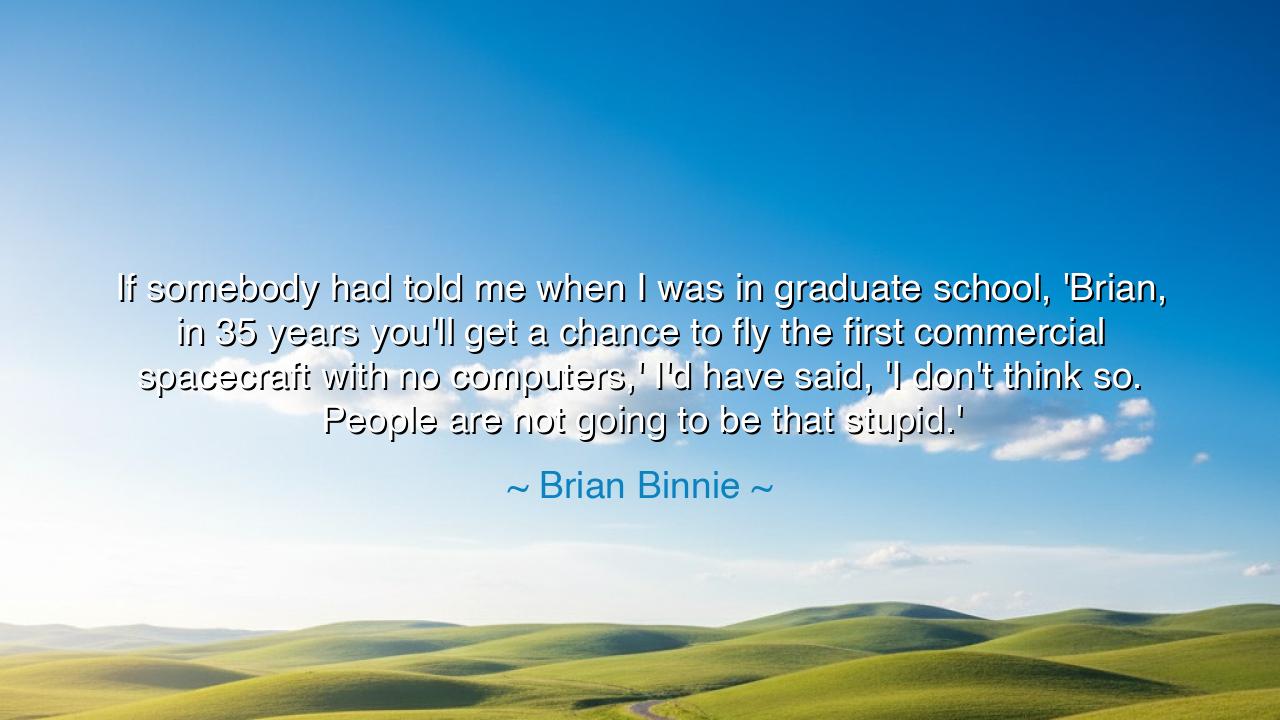
If somebody had told me when I was in graduate school, 'Brian, in
If somebody had told me when I was in graduate school, 'Brian, in 35 years you'll get a chance to fly the first commercial spacecraft with no computers,' I'd have said, 'I don't think so. People are not going to be that stupid.'






In the voice of Brian Binnie, test pilot, engineer, and pioneer of the skies, there rings both awe and irony as he declares: “If somebody had told me when I was in graduate school, ‘Brian, in 35 years you’ll get a chance to fly the first commercial spacecraft with no computers,’ I’d have said, ‘I don’t think so. People are not going to be that stupid.’” At first glance, his words seem laced with humor — a pilot’s jest at the absurdity of human choices. Yet beneath that laughter lies a profound meditation on progress, wisdom, and the fragile relationship between technology and human judgment. For Binnie speaks as one who has flown at the edge of the heavens, and from that height, he saw clearly both the brilliance and the folly of mankind.
In his youth, during the dawn of the digital revolution, computers had begun to define the boundaries of possibility. The machines that once filled rooms now fit within cockpits, guiding aircraft, plotting trajectories, and calculating with precision beyond human reach. It was an age of optimism, when technology promised safety and perfection. To imagine, as Binnie once did, a spacecraft — the pinnacle of human engineering — without the guiding presence of computers seemed madness, a regression to the chaos of trial and error. Yet, decades later, that very absurdity became his reality: he would fly SpaceShipOne, a craft of daring simplicity, powered not by automation, but by human hands and courage.
Binnie’s astonishment is not merely about engineering; it is about trust — trust in reason, in progress, and in our capacity to learn. His disbelief — “People are not going to be that stupid” — carries the echo of an ancient lament, one that has accompanied every era of human advancement. It is the voice of the wise who see that innovation, though mighty, can become arrogance when stripped of humility. For what is the use of machines if we forget their purpose? What is progress if it leads us backward, into risk and folly born of pride? The ancients would have called it hubris, the dangerous belief that human daring can outrun the laws of wisdom.
And yet, there is another side to this story. For Binnie, in flying such a craft, became a living symbol of courage and mastery. Where machines faltered, human intuition prevailed. His flight was not only a test of technology but a testament to the enduring strength of the human spirit — the same spirit that once guided sailors by the stars, that crossed oceans, that ascended mountains, that dared to reach for the moon. His incredulity at the idea of a “spacecraft with no computers” transformed, through experience, into a humbling truth: that while machines may extend our reach, they do not replace the necessity of human skill, discipline, and resolve.
It is here that Binnie’s words take on their deeper meaning. He reminds us that technology is a tool, not a substitute for wisdom. We live in an age where automation surrounds us, where decisions once made by judgment are now made by code. Yet Binnie’s story warns that blind faith in machines is no less dangerous than blind rejection of them. The true path lies between extremes — where the human mind, in partnership with technology, retains its sovereignty. For every machine is born of human imagination; and if that imagination forgets its limits, it risks creating not progress, but peril.
History offers many lessons of this truth. Recall the tale of Apollo 13, when catastrophe struck in the cold silence of space. The spacecraft’s computers were crippled, yet the crew — through ingenuity, calm, and collaboration — guided themselves home using little more than pencils, paper, and courage. The world watched as flesh and spirit triumphed over failure. It was not the machine that saved them, but the humanity that refused to surrender. So too does Binnie’s astonishment remind us that the human element — that ancient spark of creativity and adaptability — remains the heart of every endeavor, whether on Earth or among the stars.
The lesson, then, is this: never surrender your judgment to the tools you wield. The greatest dangers arise not when technology fails, but when people forget to think. Let Binnie’s incredulous words be a torch of caution for all who build, design, or dream. Trust in your tools, yes, but more than that, trust in your capacity to understand them — and to question them. For progress without wisdom is flight without navigation, and knowledge without humility is the most perilous form of ignorance.
Therefore, children of the modern age, remember the wisdom hidden in Binnie’s laughter. The machines you build are mirrors of your own mind — precise, powerful, but fallible. Let them assist you, not rule you. Keep the human hand steady upon the helm, the human heart awake within the vessel. For in the vast sky of innovation, it is not the machine that determines destiny, but the spirit of the pilot who dares to fly with both courage and reason.






AAdministratorAdministrator
Welcome, honored guests. Please leave a comment, we will respond soon